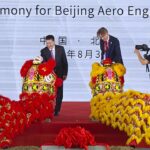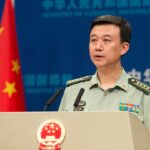US’ limiting restrictions against China, removing punitive tariffs will help bilateral ties: scholar
US Commerce Secretary Gina Raimondo concluded her 4-day visit to China on Wednesday. During meetings with senior Chinese officials, they agreed on steps to ease trade tensions, and announced the creation of a new communication mechanism to discuss export controls and other trade issues. Raimondo is the fourth senior US government official to visit China since June. What does Raimondo’s visit mean to fraught bilateral relationship? Gary Hufbauer (Hufbauer), non-resident senior fellow at the Washington-based US think tank Peterson Institute for International Economics, noted in an interview with Global Times (GT) reporter Wang Yi that the outcome of the visit matched expectations. To improve bilateral cooperation, it is critical for the US to take constructive steps like removing the punitive tariffs imposed on goods imported from China. The US scholar also said that China’s economy still has great potential to grow, noting that there is no inflation problem in China, and the room for both monetary and fiscal stimulus remains ample.
GT: During US Commerce Secretary Gina Raimondo’s recent visit to China, she met with Chinese counterpart Wang Wentao on Monday, and the two sides announced to set up a new communication mechanism to address trade issues. How do you view the outcome of the meeting?
Hufbauer: The meeting at least matched and probably exceeded public expectations. The two sides established committees to ensure more timely communications on export controls and other matters. And the ministers promised to meet on an annual basis. That was good for government work.
GT: Raimondo reportedly said the US is willing to promote “healthy cooperation” with China. But from Chinese perspective, while the US wants to ease tensions with China through enhanced high-level interactions, it continued to provoke China on its bottom line and contain China on all fronts. How do you view the contradictory approach by the US? What do you think are the stumbling blocks to China-US cooperation?
Hufbauer: I would make two observations.
First, Secretary Gina Raimondo is probably the person most favorably disposed to improve US-China relations among President Biden’s cabinet secretaries and leading figures in his administration.
Raimondo is the best spokesperson that the US has on these issues. But Chinese authorities will wonder how much authority she has, when other figures, both in the administration and in Congress, are not speaking of cooperation, the need to trade, and better relations, but rather are talking about national security risks and “decoupling.” So Chinese officials will wonder whether Raimondo’s voice is the one they should listen to, or whether they have to discount what she says because of the other voices in Washington.
The second point is that when there is rhetoric about “small yard, high fence,” or “99 percent of trade has nothing to do with national security” or other similar statements, the key issue is what are the exact limits on US export and technology cooperation with China? I imagine that, in her meetings with Chinese authorities, Secretary Raimondo might be asked to be very precise as to the limits.
We don’t know what she has said. There are examples of areas where trade is welcome, technology cooperation is welcome, and investment is welcome. I think those areas would be pleasing to her Chinese counterparts. But if she simply repeats those phrases that have been published in the press about “small yard, high fence,” “99 percent of trade not affected” and so forth, but leaves the boundaries vague, I don’t think the Chinese counterparts will be satisfied. So that’s quite critical. We don’t know the details of what she said in the meetings, but I think boundaries are very important.
GT: Raimondo is the fourth senior US official to visit China since June, following Secretary of State Antony Blinken, Treasury Secretary Janet Yellen and Climate Envoy John Kerry. How do you view the role of Raimondo’s visit in improving China-US trade and economic cooperation?
Hufbauer: Much depends on whether she is willing to identify which semiconductors can be exported, what the limits of cooperation are on artificial intelligence, and so on. If Raimondo is willing to be very specific on restrictions that the US is putting in place, then I have hope for better cooperation. The creation of a new joint committee to exchange information on US and Chinese export controls is a very constructive step.
And, on the other hand, Raimondo will obviously have questions about the treatment of US companies in China. Micron is one example, but there are others, and I’m sure she’ll be asking Chinese authorities questions about individual company issues as well as general issues like tariffs. If there’s some give-and-take, then it will be a good meeting. But if there’s no serious definition as to limits on trade and investment flows, then Raimondo’s meetings won’t make much difference from other meetings that US senior officials have had with Chinese officials.
GT: You once said that the US’ practice of “building walls” and “decoupling” in trade causes damage to the US’ own economy. Recently, “decoupling” has been replaced by “de-risking.” How do you view the US attempt to decouple from China and the rhetoric of de-risking? For the sake of the US’ own economic interests, what rectifying measures should the US take in shaping its economic and trade policy toward China?
Hufbauer: I don’t think there’s any real difference between “de-risking” and “decoupling.” The meaning really depends on the actual content. “De-risking” is essentially word play, suggesting fewer restrictions but without any precision.
But the important thing is how relations evolve. With the presidential election approaching next year, constructive statements on US relations with China will face a lot of criticism from the Republicans. This will be a political debate within the US as much as a diplomatic debate between the US and China.
And I don’t know how the political debate will go. But we know for sure that if Trump is reelected, this will be a very, very difficult time in US-China relations. Trump has been very clear on that. There will possibly be a cold war. And there will be no cooperation.
I hope that the US will remove punitive tariffs on goods imported from China, and China will reciprocally remove its penalty tariffs on American goods. And I hope that obstacles to investment by American companies in China and investment by Chinese companies in the US will be limited.
But I am skeptical that these hopes will be realized in 2023 or 2024. If Biden is reelected in November 2024, they may possibly be realized in the year 2025.
GT: The trade between China and the US has gone down this year. According to Chinese statistics, bilateral trade in the first seven months fell by 9.6 percent year-on-year, of which China’s exports to the US fell by 13 percent. Such declining trend does more harm than good to the US especially when the US is struggling with high inflation and rising debt woes. What measures can both sides take to avert the trade decline?
Hufbauer: The first thing the US President and his own officials can do is tone down aggressive rhetoric against China. That’s the least they can do. They can also be very specific, as I said before, as to what restrictions are placed on trade, rather than invoke vague “national security” limits. What does “national security” mean? It means something very different to a person like Congressman Gallagher or Senator Rubio than it does to a person like Secretary Raimondo. They use the same phrase, but their meanings are different. The Biden administration should be very specific as to what is meant by “small yard” and “national security.”
It would be still better if President Biden could take steps to remove some penalty tariffs that President Trump imposed on imports from China. A lot of products subject to penalty tariffs have nothing to do with national security. The products are intermediate goods or consumer goods. Penalty tariffs on them could all be lifted. That would be a very good thing to do. Maybe Biden could lift those tariffs without attracting a lot of adverse attention from Republicans by removing tariffs just in response to requests that American companies submit to the US Trade Representative’s office. Those are constructive steps that might be taken in the near future.
GT: Under the current situation where China-US relations are locked in a stalemate of competition and no breakthrough in improving the relations is expected in the foreseeable future. In which areas, do you think the two sides can start with to at least get the relations improved a bit?
Hufbauer: The US government should restate the one-China principle. That would be very helpful. And the US government should be specific as to areas where Chinese firms can invest in the US, and US firms can invest in China. The US government should be more welcoming on Chinese students who want to study in the US. And likewise, China should be welcoming to US students who want to study in China. Those are the kinds of things that could be done in the near term to improve relations.
GT: Many economists believe China is on track of post-pandemic economic recovery and in the medium and long term, Chinese economy enjoys vast growth potentials. Do you agree? If so, what do you think these potentials are? How can the potentials be realized? What are your suggestions for China’s economic transformation and development?
Hufbauer: There’s been a big debate in the Western press on the outlook for Chinese economy. Some commentators are very pessimistic. I do not agree with them. I think China’s economy still has the potential to grow at 4-5 percent annually. That’s slower than in the past, but much better than other advanced countries’ future growth rates, which will be about 2 percent in Europe, the US and Japan.
What I think China needs to do is enact much stronger stimulus measures in the current period. When there’s youth unemployment and consumers are hesitant to buy a new apartment or durable goods, stimulus measures can help. In the past, when the Chinese economy lagged, the authorities provided a lot of stimulus, but this time, not so much. I think they could do far more, especially since inflation is not a problem in China. China has room for both monetary and fiscal stimulus. China also has room to increase the productivity of workers in service sectors as well as manufacturing. And that will be the foundation for achieving 4 percent annual growth in the future. I’m optimistic that China can turn in a good growth performance.
China can do very well in new technology areas because China trains a large number of scientists and engineers in its universities. And that enables the labor force to do well in areas like semiconductors, quantum computing, artificial intelligence, new materials, aircraft and others. Those will be very big growth areas. Meanwhile, China can learn from Europe, US and other advanced countries on ways to improve the efficiency of its service sectors. Services are a big percentage of every country’s economy.
Labor productivity in Chinese service sectors could be much higher. I’m talking about things like retail trade, financial services, medical services, and postal services. China is already very strong on cell phone services.
In China, as I understand, almost everyone conducts financial transactions on their cell phones. The government can identify people over 60 years of age, and it could give each of these people a certain amount of cash through their cell phones, something equivalent to $500 to boost consumption. That would be an easy thing to do. The government could also rescue companies like Evergrande and Country Garden to finish the construction of apartments, and make sure that the properties are put to good use for the Chinese people. Those are obvious things that the government could do to provide more stimulus to the economy and ensure 4 percent economic growth.
(Global Times)




